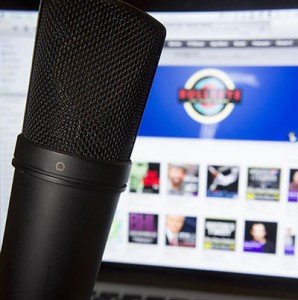 I spend something on the order of 5 – 10 hours per week with podcasts, often more time than I spend with broadcast radio. I enjoy the easy ability to take them with you, to start and stop as necessary, and the podcast tendency towards longer form interviews.
I spend something on the order of 5 – 10 hours per week with podcasts, often more time than I spend with broadcast radio. I enjoy the easy ability to take them with you, to start and stop as necessary, and the podcast tendency towards longer form interviews.
I’ve been giving a fair amount of thought to the place and future of podcasting lately, something I’ve not been alone in doing. Popular and successful podcasters think podcasting is looking strong, but I’m wondering if the future of podcasting might be the end of podcasting as a discrete medium, as it melts into the online radio stew.
Podcasting was the topic of a session at SXSW last week, moderated by BBC producer Colin Anderson. MySanAntonio.com and public radio KUT reported on the panel, reflecting a pretty rosy outlook. MySanAntonio.com’s Benjamin Olivo noted that the panelists, like podcaster Helen Zaltzman, emphasized the loyalty and devotedness of podcast listeners as compared to a “casual radio audience.”
Panelist Jesse Thorn built his small Maximum Fun radio empire on a hybrid mix of traditional public radio and more freewheeling podcasts anchored by his Bullseye program, formerly known as the Sound of Young America. He observed that it still takes too many steps to listen to podcasts, from subscribing on your computer, downloading to your mobile device and then having to connect that device to your car stereo.
That particular point resonates with me and conversations I’ve had recently with other podcast listeners. Just a week ago I was discussing the place of podcasting in the media landscape with my brother Kyle Riismandel, who is big podcast fan and has contributed some podcast reviews to Radio Survivor, and my friend Jenny Benevento. Jenny, in particular, is someone who doesn’t consume much live, real-time radio or television, taking in most of her media via on demand sources and downloads. She contends this is the direction media consumption is going, and only the producers who recognize it and make their programs easily available for downloaded or on demand viewing and listening will survive.
Podcasting, obviously, fits into this paradigm. However, as Thorn observes, the process is not yet as simple as turning on your TiVo or DVR. Furthermore, in the on demand universe the difference between a podcast and a radio show becomes about as insignificant as the difference between a television show on your DVR and a movie on Netflix. There is still a difference there, but it exists more as an annoyance and a barrier for a consumer to overcome than any sort of inherent difference.
This line of reasoning begs the question: will podcasting remain its own medium, or will it merge into a larger universe of online radio? In that universe the only difference will be live vs. on demand, just like what’s happening to television. In fact, there are several podcasts produced by networks like TWiT and 5by5 that are streamed live at the same time they are recorded for subsequent podcast distribution, further blurring the distinction between podcasts and radio.
Services like Stitcher and DAR.fm are moving us towards that universe where podcasts and radio programs live alongside each other with no artificial divisions. Even live broadcasting stalwarts like iHeartRadio and SiriusXM are going in that direction, with each offering a selection of on demand programs in addition to their wider live station inventory.
This merged online radio universe is most easily experienced using a computer, or listening directly to a mobile device. But once you want to move to the living room or car the transition isn’t quite so seamless. While the convergence of the mobile device with the car or home stereo is happening, it’s not yet a holistic experience for most people. It still requires more wires, fiddling, plugging and unplugging that keeps this a realm for only the most dedicated listeners.
Yet, I think we can look forward to a more successful merger. Podcasting will receive a serious boost when a listener can turn on just about any internet connected device–a home theater receiver, smartphone or car stereo–and listen to her favorite radio program just as easily as turning on the television and selecting her favorite show, whether it’s a podcast, on demand stream or live recording. We’re not quite there yet with television, either, although I’d argue that with newer smart televisions, TiVos, Roku boxes and AppleTV, we are a bit closer.
My only caution about this universe is that we don’t lose the independent and DIY spirit of podcasting in the transition. It is so much easier and less expensive to produce a podcast that can compete with network radio than it is to produce a video program that looks like network television (though the gap is narrowing). This aspect is what has allowed podcasting to develop as an medium with room for independent producers to find an audience right next to the best of public and commercial radio.
I seriously hope we see more inclusive models, like Stitcher’s, DAR’s and iTunes’, prevail, rather than the more closed models like iHeartRadio. We cannot afford to let the Clear Channel model take over online radio, too, obliterating independent podcasting in the process.


